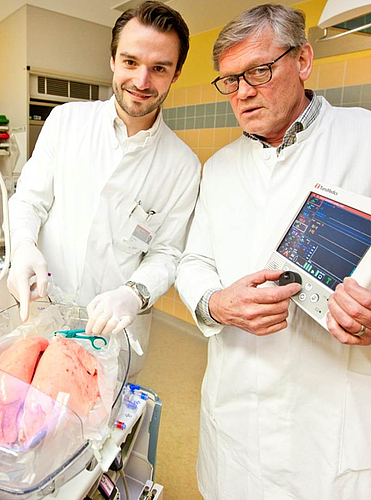In the pilot study, the team, headed by Professor Axel Haverich, Director of the Department of Cardiothoracic, Transplantation and Vascular Surgery (HTTG), investigated the use of high-dose antibiotics in explanted lungs in the Organ Care System (OCSTM) in pigs as a therapy option for otherwise incurable antibiotic-resistant lung infections. The physicians compared treatment with a physically-compatible dose of the antibiotic colistin with a hundred-fold dose of colistin administered to explanted diseased lungs in the OCSTM. "This dose would be highly toxic for the patient. It would lead to kidney failure and damage to the central nervous system, "explains Dr. Norman Zinne, from the Department of Cardiothoracic, Transplantation and Vascular Surgery.
To treat the lung infection, the doctors first explanted the diseased lung and implanted it in an Organ Care System. The OCSTM is a mobile device for ex vivo lung perfusion. In the device, the organ can be transported at body temperature, perfused with donor blood and supplied with nutrients - or antibiotics. The lung is kept ventilated during the treatment, ensuring a constant supply of oxygen.
After two hours of treatment, the doctors implanted the lung back into the animal. "While in the untreated control group and the conventionally treated group, only one third of the pigs survived the pneumonia, two-thirds of the animals whose lungs we treated outside the body recovered from the disease," says Dr. Zinne. Also, the clinical symptoms of the infection were less severe in the OCS group than in the other groups. "The results show that treating multidrug-resistant pneumonia with very high-dose of antibiotics has potential as a new therapeutic strategy for severe infections that otherwise lack alternative therapies," says Professor Haverich. "Before we can safely apply the method to humans, further research in animal models is needed," he says. "It is conceivable that the method can be transferred to other organs such as the heart or used for the administration of other therapies, such as chemo- or cell therapies."
The antibiotic colistin - Colistin is an antibiotic that has been known since the 1950s, but is rarely used in clinical practice due to its toxic effects on the body. Following the emergence of antibiotic-resistant bacteria, colistin has however seen increasingly use as a reserve antibiotic for the treatment of pneumonia caused by the antibiotic-resistant bacterium Pseudomonas aeruginosa.
The project was supported by the German Center for Lung Research BREATH (Biomedical Research in Endstage and Obstructive Lung Disease), funded by the Federal Ministry of Education and Research, and by the Cluster of Excellence REBIRTH (from Regenerative Biology to Reconstructive Therapy), funded by the German Research Foundation.
The original publication can be found here.
For further information, please contact Professor Dr. Axel Haverich, phone (0511) 532-6581.
Text: REBIRTH / CM
Picture: MHH / Kaiser

Dr. Norman Zinne and Professor Dr. Axel Haverich with an Organ Care System (OCS).